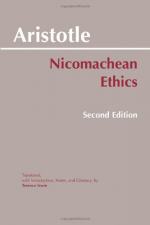
|
| Name: _________________________ | Period: ___________________ |
This test consists of 5 short answer questions, 10 short essay questions, and 1 (of 3) essay topics.
Short Answer Questions
1. What virtue does Aristotle state is concerned with the same things, and is present in the same things, as friendship?
2. What determines the proper level of affection that one ought to give another, according to Aristotle?
3. What sort of rule is opposite to that of a just monarch, according to the observations of Aristotle?
4. With the beginnings of what consideration does Aristotle end the Ethics?
5. By their intelligent deliberations, concerning what are those who have practical judgment distinguished from others, according to Aristotle's philosophical inquiry?
Short Essay Questions
1. What does Aristotle intend to convey by comparing vice to the disease of consumption (tuberculosis)?
2. Why does Aristotle state that pleasure is not a motion?
3. What is meant by Aristotle saying that pleasures from different sources can be impediments to activities?
4. Explain the distinction, and its significance, between Socrates and Aristotle on the relationship between knowledge and moral action.
5. Why is it said by Aristotle that the lesser types of friendship are called friendship only insofar as they resemble the highest?
6. Why does Aristotle end his discussion of ethics by beginning a discussion of politics?
7. Why does Aristotle state that mothers have greater love for their children than children for their parents?
8. Why is it that having friends in a time of one's good fortune is, in the philosophy of Aristotle, more beautiful than in other times?
9. What is the essential unity that Aristotle claims between knowledge and action in the person possessed of practical judgment?
10. Explain the relationship Aristotle makes note of between affirming and denying in thinking and pursuing, and avoiding in desiring.
Essay Topics
Write an essay for ONE of the following topics:
Essay Topic 1
As that which rightly governs man's being, it can be reasonably stated that practical judgment is the most important of all virtues. Compose an essay which analyzes the virtue of practical judgment. In what does it consist? Why is it a virtue? What other virtues are entailed in its being possessed? How is it superior to other virtues? What is its end?
Essay Topic 2
Oftentimes, a true friend is considered to be, in a certain sense, a second self. Compose an essay which considers this claim in the context of Aristotle's examination of friendship. What would it mean for someone to be a second self? How is true friendship related to others? How is friendship related to the self? In what sort of acts does one treat another as though a second self? What characterizes these acts?
Essay Topic 3
Of the intellectual virtues, art is the only one inherently ordained for some other end and not at all for itself, for it is concerned entirely with making. Discuss the virtue of art in a thoroughly well-reasoned analytical essay. Why is art a virtue? With what sort of things is art concerned, in particular? What are some specific examples of art as a virtue? Why is art in some way lesser than the other intellectual virtues? Why is art a necessary virtue?
|
This section contains 1,047 words (approx. 4 pages at 300 words per page) |

|




